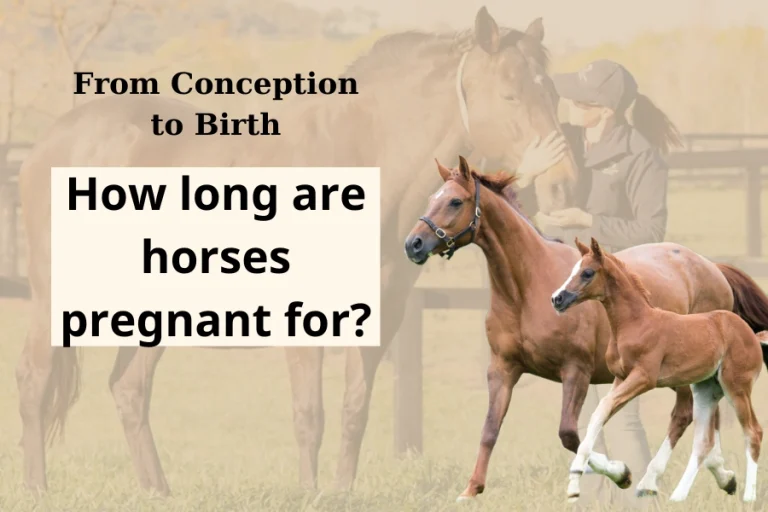How Long Can A Horse Go Without Water? Horse Hydration Facts
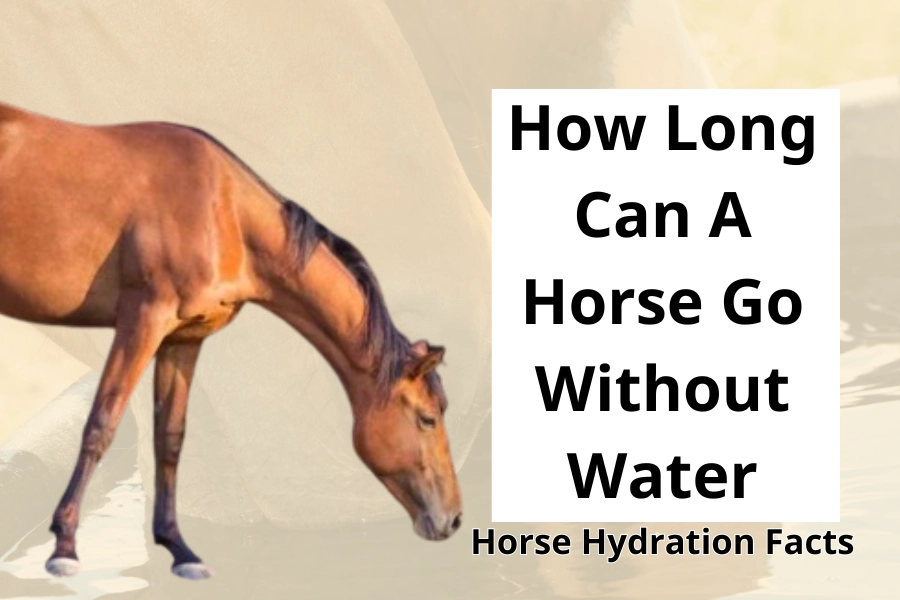
Have you ever wondered how long can a horse go without water? Horses are known as a symbol of strength and endurance. We often see images of horses galloping across the grasslands for hours without getting tired. However, few people know that behind that strong appearance is a body susceptible to water deficiency.
An adult horse can drink up to 25-50 liters of water daily. So, what happens if a horse is dehydrated? And how much water is enough for your horse? The answer will surprise you. RaxinHorse will answer all the questions surrounding horse dehydration right after this!
How Long Can a Horse Go Without Water?
You may not know an interesting fact: horses can survive for nearly one month without food. However, they can only endure water shortage for a few days. So, how long can a horse go without water? According to some statistics, horses can endure water shortages for up to 5 days.
However, a long-term shortage of water can cause serious health problems such as dehydration, kidney failure, and even death. Signs of dehydration can be sunken eyes, loss of elastic skin, fast heartbeat, shortness of breath, and lethargy.
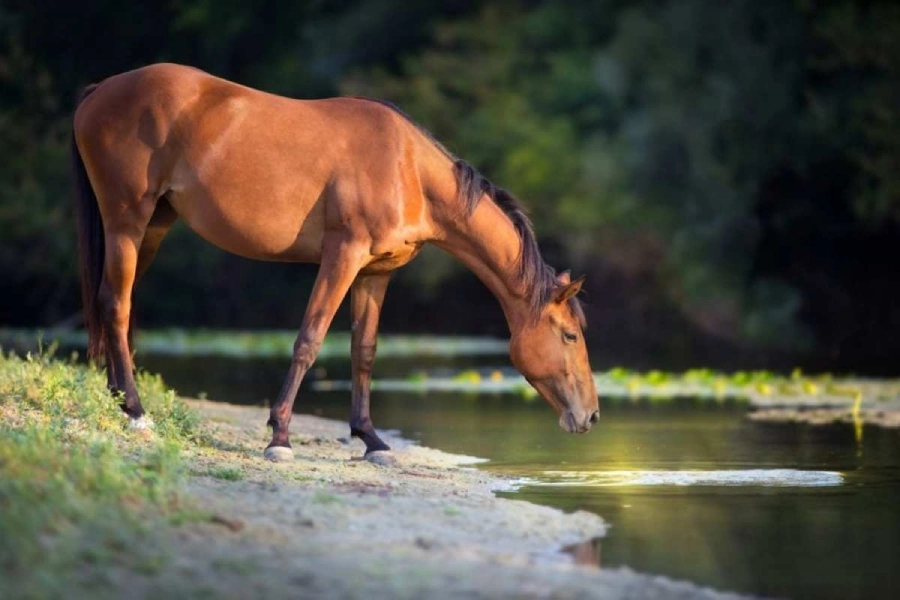
Water Requirements for Horses
To answer the question of how long can a horse go without water, we must first understand how much it needs. Typically, horses will need 5-10 gallons (equivalent to 25-50 liters) of water daily. They can fast for a few weeks but only be thirsty for a few days.
Water plays a vital role in the life of horses. Water helps regulate body temperature, support the digestive system, and eliminate toxins. Supplying water for horses also helps them keep the skin moist, ensuring good movement of joints and other functions of the body.
Thus, how often should horses drink water each day? Experts advise that horses should not stop drinking water for more than three to four hours. Not all horses need the same water. Horse water consumption is influenced by several variables. Therefore, you should learn carefully to provide enough water for your horse.
Factors Affecting Horse’s Water Consumption
For you to have a clearer view of how long can a horse go without water, we will learn about the water consumption in horses.
Horses’ Size
The first factor that affects the water consumption in horses is their size. Large horses have a larger body mass, requiring more energy to maintain living activities. Therefore, they will need more water than miniature horses.
In addition, due to the horses’ more significant surface area, water loss through the skin and respiration is more. Therefore, they will also need to add more water.
Activity Level
Physical activity also affects horses drinking water. The more active horses will sweat more and need more water than the horses to rest. For example, horses that do a lot of work, like pulling heavy loads, will need to drink more water than horses that just walk around the yard.
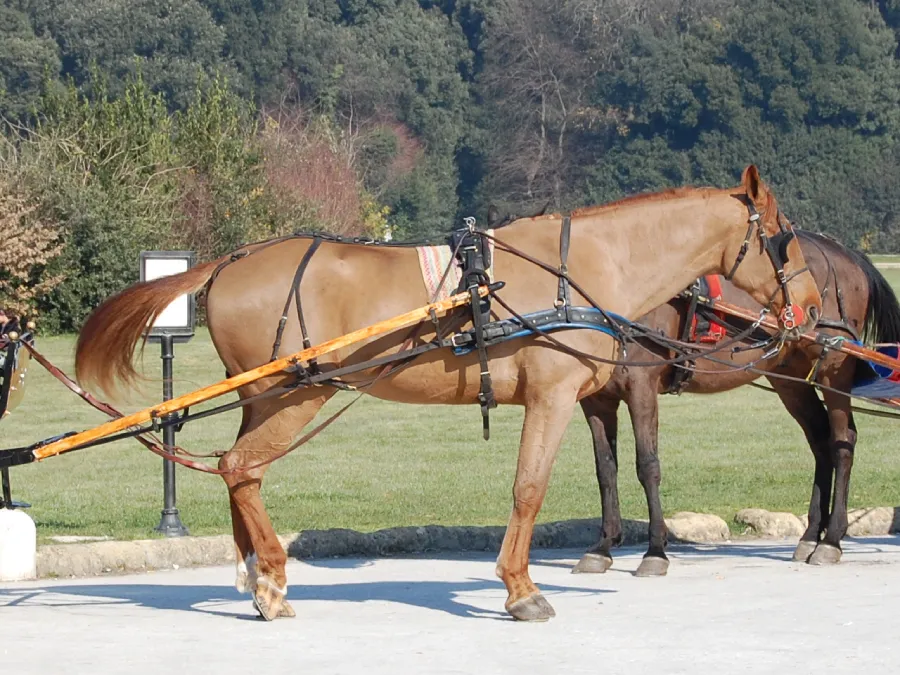
Weather Conditions
The weather is one of the most important factors affecting how long can a horse go without water. On hot days, horses will easily sweat and need to drink a lot of water to compensate for lost water. Also, high temperatures will increase the speed of evaporation through the skin and lungs, causing horses to lose more water. As a result, summertime water needs for horses will be higher than wintertime needs.
Diet
The diet will also affect the water consumption of the horse. Horses raised with grass often need less water because they can recharge from fresh grass. Meanwhile, horses who eat cereals, condensed food, or hay need more water. Because these foods have been dried and removed moisture, horses cannot absorb water from them.
In addition to the primary factors, some other factors also affect the consumption of horse water, such as age, the level of salt in sweat, or the health status of horses. Pregnant horses will need more water to supply “baby” horses.
Signs of Dehydration in Horses
In addition to how long can a horse go without water, many horse grooms are also interested in detecting dehydrated horses. The following are warning signs (J C Pritchard 1, C C Burn, A R S Barr, H R Whay, n.d., #) that you should “recharge water” for your companion.
- Sweat: Horses are dehydrated and will be sweaty, especially in areas around the neck, chest, and abdomen. Their sweat will stick to the skin and not evaporate.
- Skin: The skin of a dehydrated horse will lose elasticity and cannot return to its original position after being grabbed. Horse hair will also become ruffled and dry.
- Eyes: One of the most noticeable features when horses are dehydrated is their eyes. The horse’s eyes will be sunken, the white irises will be yellow, and the mucous membrane will become dry and pink when they are dehydrated.
- Mucosa: mouth mucosa, dry nose, and light pink (according to research by the National Library of Medicine).
In addition to external signs, the horse’s behavior will also be unusual when dehydrated. Horses are seriously shortened; they will be passive and lazy, breathing and heartbeat quickly. There will also be less urinating or dark yellow urine signals, which are signs of water shortage.
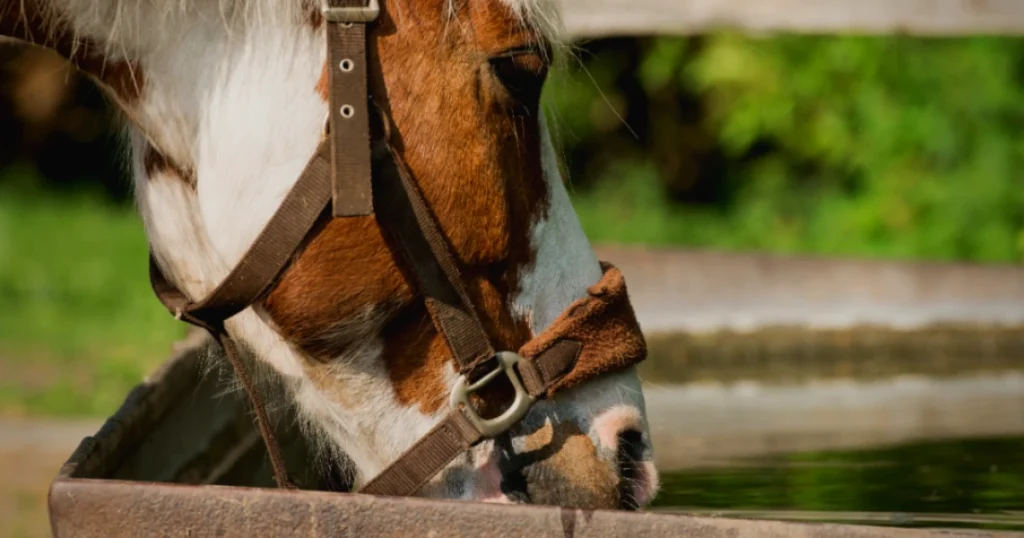
Dangers of Dehydration
How long can a horse go without water? The answer is about 2-3 days; the highest is five days. However, letting horses dehydrated for a long time will lead to many serious health problems, such as:
Impaired functional functions
One of the most common dangers of dehydration in horses is the decline in body functions. The first is the kidney. Kidney deficiency will reduce the ability to dialysis, leading to the accumulation of toxins in the body. Long-term dehydration will lead to renal failure.
Dehydration in horses also affects heart activity. When horses lack water, blood vessels will shrink, and blood is denser and more difficult to circulate. To maintain the supply of oxygen and nutrients to the cells, the heart must work more to pump blood all over the body. The heart needs to be more active; it will lead to heart failure in the long term.
Dehydration can also cause electrolytes, affecting the function of the nervous system and leading to symptoms such as seizures and coma.
Reduce performance
The horse’s body lacks fluids to carry nutrients and oxygen to the cells when it is dehydrated. This weakens their muscles, reducing their ability to contract and leading to fatigue. Dehydration also makes the joints dry, making it difficult for horses to move slowly.
When working, horses will sweat and become dehydrated. At that time, they need to be compensated for the lost water. Therefore, the horse’s stability will decrease if there is a water shortage. Excessive sweating but not rehydration will make them easy to exhaust.
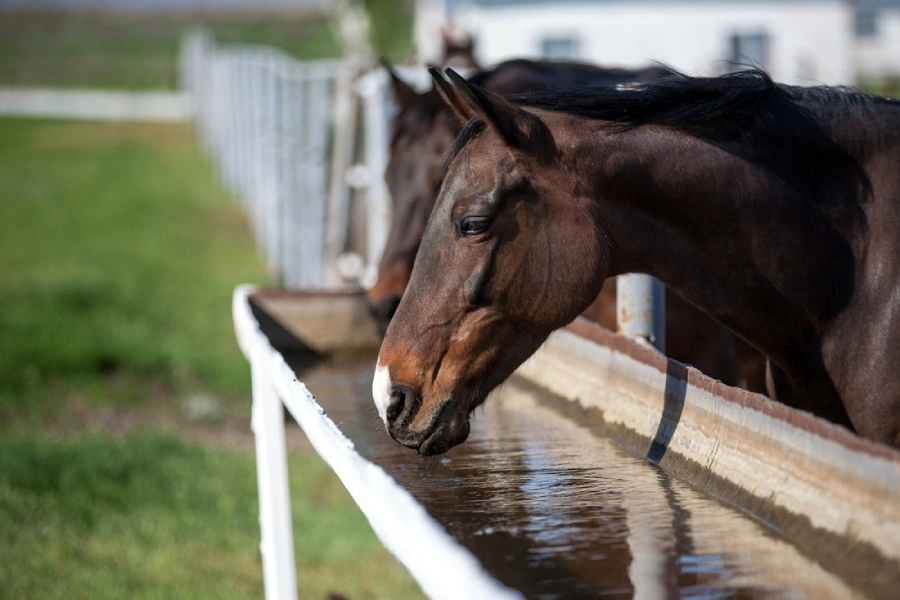
Reduce resistance
Water plays a vital role in transporting immune cells and antibodies to infection sites. When dehydrated, the immune system works inefficiently, making horses vulnerable to bacteria and viruses. Minor wounds, scratches on the skin, or gastrointestinal problems become more serious when the immune system weakens.
Muscle damage
Water helps the horse’s body regulate temperature and moisturize muscle groups. When horses are dehydrated, body temperature will not be balanced, leading to overheating. Overheating will cause muscle damage, causing muscle inflammation or even muscle tear.
Death
Finally, the most dangerous is death. Severe dehydration leads to a decrease in blood volume and blood pressure. This can be shocking, a life-threatening situation for horses. In addition, dehydration also causes multiple organs (kidney, liver, heart).
How long can a horse go without water? About 5 days. But long-term dehydration will lead to many health risks for your horse. Therefore, you need to pay attention to the problem of adding water and electrolytes for your companion (Teresa Hollands, Academic Editor; Ingrid Vervuert, Academic Editor; Anna Jansson, Academic Editor, and Charlotte L. Ridgway, Academic Editor, 2022, #). You can feed horses some fruits with high water content such as apples, bananas, watermelon, and carrots, or soak the hay to replenish the horse’s water.
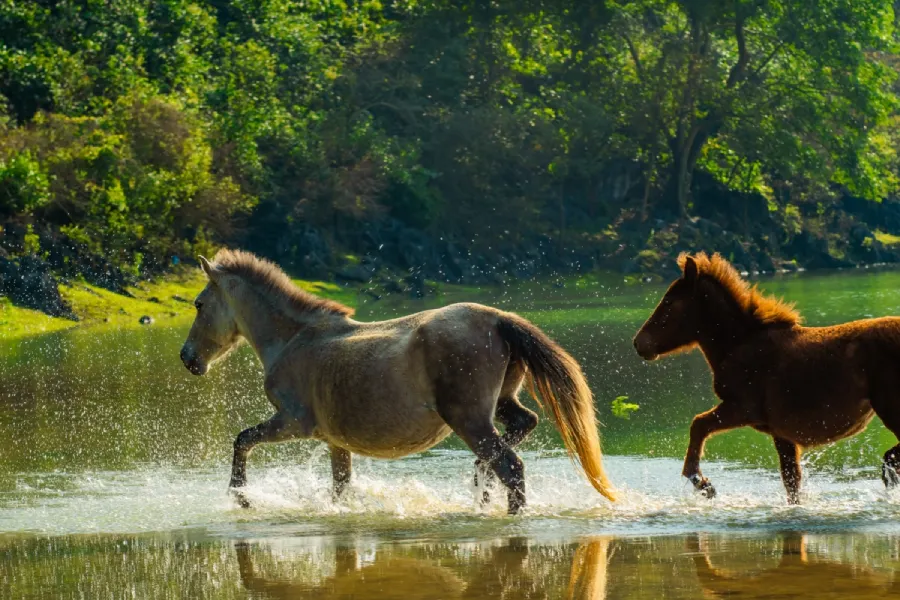
Horses can go the longest without water for about five days. However, after the first 48 hours, horses will exhibit signs of suffering, such as abdominal pain, shortness of breath, and alertness.
The fastest way to replenish your horse’s water is to drink them with electrolyte water. If not, you can also use the infusion method through the stomach catheter or intravenously (IV) by the veterinarian.
There are many reasons why horses don’t want to drink water. They may have health problems with teeth, gastrointestinal tract, or other diseases that may not want to drink water. It may also be caused by water with a strange smell, uncomfortable taste, or pollution. Another cause that may cause horses to drink water is that they feel the surroundings are not safe enough or they are stressed.
Bottom Line
So, we have learned together about the importance of water for the health of horses. Providing enough clean, fresh water is indispensable in caring for and raising this noble animal. To ensure the horse is always healthy, you should regularly check the water source, change the water daily, and clean the drinking trough.
In addition, unusual signs of the horse, such as reduced eating, lack of exercise, or abdominal pain, should be observed. Your question of how long can a horse go without water now has an answer, right? Always pay attention to your four-legged friends’ needs, so they are always healthy and full of energy!
References
- J C Pritchard 1, C C Burn, A R S Barr, H R Whay. (n.d.). Validity of indicators of dehydration in working horses: a longitudinal study of changes in skin tent duration, mucous membrane dryness and drinking behaviour. National Library of Medicine. https://pubmed.ncbi.nlm.nih.gov/18356129/
- Teresa Hollands, Academic Editor, Ingrid Vervuert, Academic Editor, Anna Jansson, Academic Editor, and Charlotte L. Ridgway, Academic Editor. (2022, November 10). Oral Electrolyte and Water Supplementation in Horses. National Institutes of Health. https://www.ncbi.nlm.nih.gov/pmc/articles/PMC9696292/



